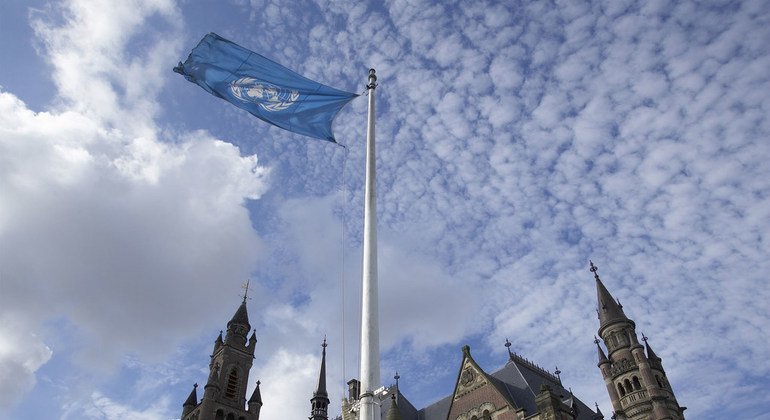Find the full version of this interview here, as originally published by the UN Regional Information Centre for Western Europe (UNRIC). Today at the ICJ, also known as the ‘World Court’, four out of 15 judges are women, including the President of the Court, Joan E. Donoghue. In total, the Hague-based Court has had five female judges in its history, compared to 106 male judges. Dame Rosalyn Higgins: For women to be able to get to that position, they have to be extremely hard-working and very able. However, I am for quality and if the best person is a woman that is splendid, if the best person is from an ethnic minority, that is splendid, but I am not looking for gender parity. The public does expect that a court handing down judgements that might affect them, or their relatives, or issues they care about, should be handed down by people who don’t look different from themselves. There must be diversity to reflect society, not on a parity basis or on a percentage basis, but to represent more generally the population by having the most capable people out there. To mark the International Day, the United Nations in Western Europe interviewed three of Court’s judges: Hanqin Xue, Judge at the ICJ since 2010 and Vice President from 2018 to 2021; Hilary Charlesworth, Judge at the ICJ since November 2021; and Dame Rosalyn Higgins, Judge at the ICJ from 1995 to 2009 and President from 2006-2009. Hilary Charlesworth: In the 28 years since Dame Rosalyn Higgins was first elected to the Court, there have been four more women elected, including me. This indicates quite slow progress. There are elections to the Court this year, but it is likely that the number of women judges will either go down or will remain the same, so I don’t think progress is secure in that way. In the future, I would like to see a faster rate of change. The UN system is committed to 50-50 gender parity at all levels, and I would like to see the Court achieve that. Of course, that is not up to the Court itself, but to national groups who are responsible for nominating judges and the States supporting those nominations. In the longer term, I would like to see the day when the election of women judges to the Court is not a matter of comment, when it is just taken for granted. Hanqin Xue: So far, not even a third of [ICJ] judge members are women. It is high time to recognise women’s achievements. The United Nations has been playing a key role and is a driving force to promote gender parity. You have to educate people constantly about gender parity to counter the traditional bias regarding women professionals. It is not a question of numbers, it is a question of attitude. If you have three or five or half of the members being women judges, it doesn’t make too much of a difference. When people no longer pay attention to the numbers of women judges, that means it is no longer an issue. And currently, we still have a gap to fill. Women’s participation in the judiciary is essential to ensure courts reflect the makeup of society and address citizens’ concerns. Women judges enhance the legitimacy of courts, sending a powerful message that they are open and accessible to all those who seek justice.

Gender equality in the judiciary has been historically unbalanced, including at the International Court of Justice (ICJ), the principal judicial organ of the United Nations. ICJ/Jeroen Bouman UNRIC: How would you describe the progress of gender parity at the ICJ, or more broadly in the judiciary? The first woman to be elected as a member of the ICJ in 1995 was Dame Rosalyn Higgins, who in 2006 also became the first female President of the Court. Dame Rosalyn Higgins: Part of the answer lies with State parties. During the early part of my time at the Court, the Secretary-General made a formal statement that States should, where they see the possibility, recommend a woman for a senior post, if the woman was of comparable quality. He was not just talking about courts but about the UN system generally. The other part of the answer lies with education. The problem goes right back to opportunities and development in school years, if women are to come forward later on the basis of quality. It is important that girls have the same advantages in schools as boys do. So that at a later stage, women can come through top law schools. “The fight for women’s emancipation has been going on for a long time. Yet, the Court did not have a woman judge until 1995. That is late. It is high time to recognize women’s achievements, women’s contributions and their competence and talents in the international field,” said Judge Hanqin Xue. UNRIC: What kind of initiatives could be implemented to ensure that State parties take all appropriate measures to ensure women, on equal terms with men, can participate in judicial work, and the work of the Court? Hilary Charlesworth: Articles 7 and 8 of the Convention on the Elimination of All Forms of Discrimination against Women (CEDAW) are two important provisions calling on States parties to the Treaty to ensure equality of women’s access to public life nationally and internationally. Article 8 specifically calls on States to take all efforts to ensure equal opportunity for women to participate in the work of international organisations. This is very relevant to the Court. In addition, the 6th Committee of the General Assembly, the Legal Committee, could encourage States to nominate more women for election to international courts and tribunals.